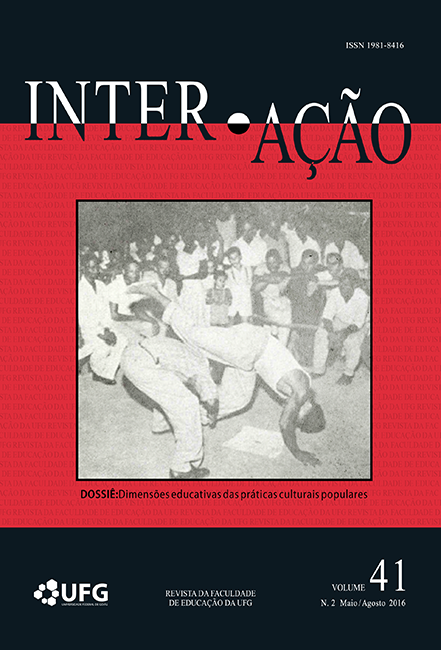A CONGADA COMO ESPAÇO DE SOCIALIZAÇÃO E APRENDIZAGEM: ENTRE O PASSADO E O PRESENTE
DOI:
https://doi.org/10.5216/ia.v41i2.40803Keywords:
Palavras Chave, Jovens – congada – cidade - educaçãoAbstract
Este texto procura apresentar como se dá parte da dinâmica produzida pela relação entre os jovens, a cidade e a congada, numa contínua e descontínua relação de constituição e aprendizagem. A partir dos jovens congadeiros foi possível compreender como, em Goiânia, se configuram as práticas socioespaciais da congada numa troca com os mais velhos e com a própria cidade. Nessa busca, foi necessário recorrer à bibliografia referente à temática e ao trabalho de campo, que implicou o registro fotográfico e entrevista. A congada, que é celebrada por meio dos ternos de congo, tem sua principal atuação nos festejos que comemoram Nossa Senhora do Rosário. Os jovens foram o principal canal de tradução para conhecer as possíveis conexões que apontam a existência e a permanência da congada na cidade.
Downloads
Downloads
Published
How to Cite
Issue
Section
License
Inter-Ação uses the Creative Commons Attribution 4.0 License for Open Access Journals (Open Archives Initiative - OAI) as the basis for the transfer of rights. Open access means making documents available on the Internet free of charge, so that users can read, download, copy, distribute, print, search, or link to the full text of documents, process them for indexing, use them as input data for software programs, or use them for any other lawful purpose, without financial, legal, or technical barriers.
Authors publishing in this journal agree to the following conditions:
1) Authors retain copyright and grant the journal the right of first publication, with the work simultaneously licensed under the Creative Commons Attribution License, which permits redistribution of the work with attribution and first publication in this journal.
2) Authors are permitted to enter into additional, separate agreements for non-exclusive distribution of the version of the work published in this journal (e.g., for publication in an institutional repository or as a book chapter), with attribution and first publication in this journal.
3) Authors are permitted and encouraged to publish and distribute their work online (e.g. in institutional repositories or on their home page) at any time before or during the editorial process, as this may generate productive changes as well as increase the impact and citation of the published work.















